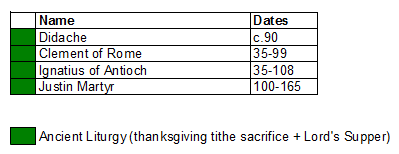The original liturgy:

The Roman liturgy:

Clement of Rome
In “Letter to the Corinthians. §38,44”, Clement of Rome speaks of helping the poor, the giving of thanks (“ευχαριστειν”), and of presenting the tithe offerings or gifts (“δῶρα”), although as with Justin Martyr you need to reference Roman Catholic J.P. Migne’s Patrologia Graeca (1857–1866) in vol I, 285,300, to see how the English translation linked above obscures this.
Such obscuring leads to apologists taking these quotes…
…to imply—since it is not stated—that the early church offered a sacrifice of consecrated bread or of Christ, rather than a sacrifice (or “δῶρα” gift) of the tithe:
Notice that English translators have misleadingly chosen to interpret Clement’s “gift” as “sacrifice” to make it seem as if what was offered was Christ’s body, rather than the gifts of the tithe? A Roman Catholic can look at this and say “see, the Mass Sacrifice is being offered!” But what is offered is gifts, that is, what the New Testament calls the tithes. The allusion to the “Mass Sacrifice” is an illusory trick of translation.
Recall in Part 2: The Didache the citation of Matthew 5:23-24 and Malachi 1:11 together?
For
Citation: Clement of Rome, “To the Corinthians.” Chapter 52 (80AD)
The gifts of the early church were its tithes, and it is these that were offered in thanksgiving and praise to God with a contrite heart. The gifts that Clement offered were simply the fulfillment of Malachi 1:11.
Clement merely echoes the language of scripture to describe the eucharist—tithe offering—giving of thanks. The Roman liturgy is nowhere to be found. In other words, Clement only describes the (1-3) offering of the Eucharist while not discussing the (4-5) celebration of the Lord’s Supper. This is just as how modern Protestants treat these as separate “ceremonies”—though they are related by the tithes themselves, as the elements are selected from the tithes. But, for the Roman Catholic, these must exist at the same time in the liturgy, and so for them to be missing is a big problem that needs to be explained.
Reference: “The Collapse of the Eucharist, Part 1”


Pingback: The Eucharist, Part 2: The Didache
Pingback: The Eucharist, Part 6: Irenaeus of Lyons
Pingback: The Eucharist, Part 10: Origen of Alexandria
Pingback: The Eucharist, Part 11: Cyprian of Carthage
Pingback: The Eucharist, Part 12: Hippolytus of Rome
Pingback: The Eucharist, Part 16: Apostolic Constitutions
Pingback: The Eucharist, Part 32: Interlude